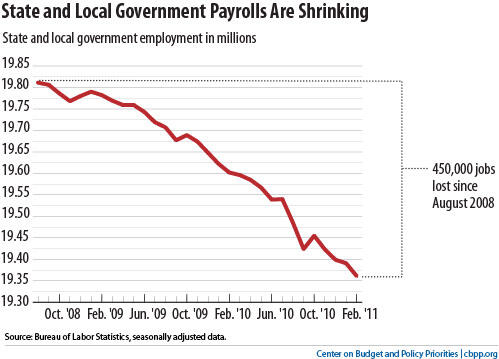off the charts
POLICY INSIGHT
BEYOND THE NUMBERS
BEYOND THE NUMBERS
30,000 State and Local Jobs Cut in February - Even As Private Sector Made Gains
Receive the latest news and reports from the Center
Teachers, nurses, police officers, and others who work for state and local governments are still suffering from the ongoing impact of the recession.
States, school districts, counties, and cities cut 30,000 jobs in February, according to the Bureau of Labor Statistics. It was the 24th month out of the last 30 months that the state and local sector lost jobs. The continuing bad news for state and local employees comes even as the private sector slowly gains jobs.
Why? States and localities have less revenue to pay salaries and wages. State revenue remains 11 percent below pre-recession levels.
The cuts have been widespread. Since state and local employment peaked in August 2008, payrolls have shrunk by 450,000 (see graph below). For example:

Meanwhile, the number of people that states and localities serve has continued to increase. Medicaid enrollment has grown by 7.6 million people, as large numbers of workers have been laid off and lost their job-based health coverage. There are an estimated 741,000 more students in public schools than when the recession began. The numbers of senior citizens, young children, and the unemployed — three groups that tend to use more public services — have also grown.
Over the longer term as well, state and local government employment is shrinking as a share of the population:
Continuing state budget woes suggest that the public-sector workforce will likely experience more cuts over the next year or more. (At least 13 states already have proposed additional layoffs or compensation cuts for public employees in the coming fiscal year.) And, given the labor-intensive nature of most government services (teaching, policing, firefighting, health care, and the like), it’s hard to see how these workers can continue to be cut without seriously harming the quality of life of the communities they serve.